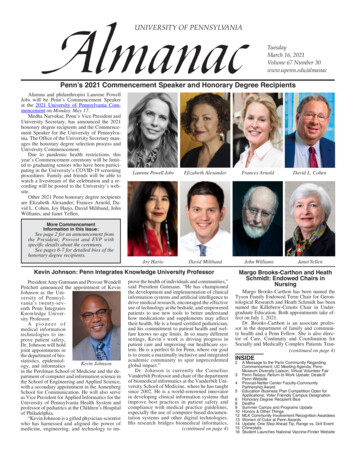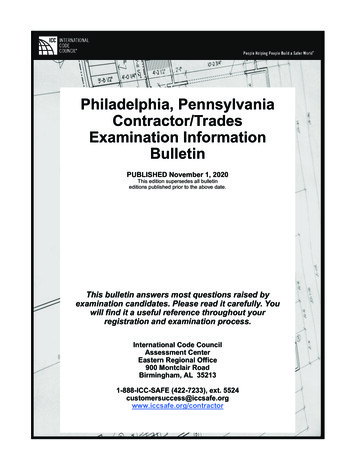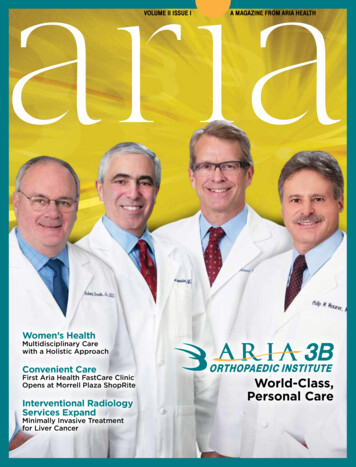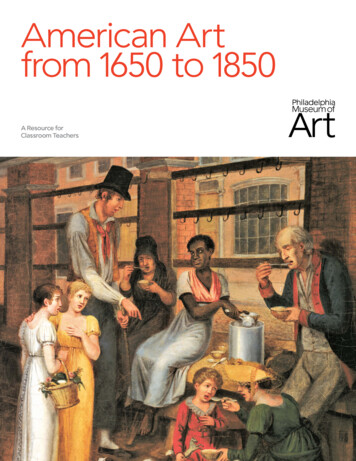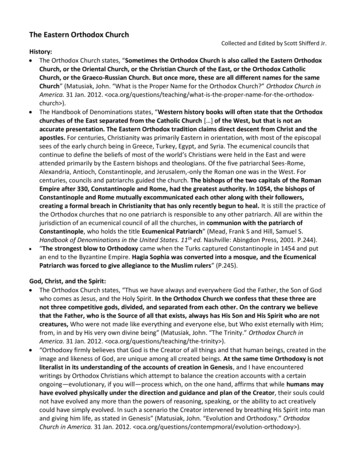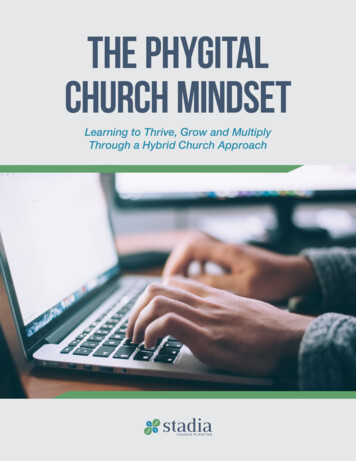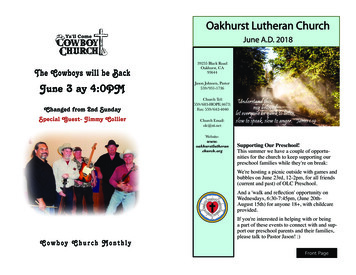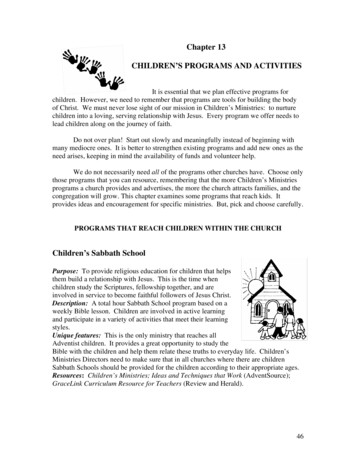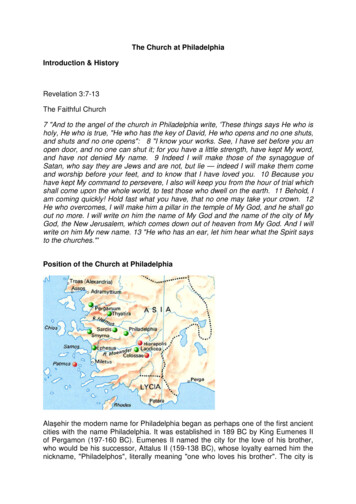
Transcription
The Church at PhiladelphiaIntroduction & HistoryRevelation 3:7-13The Faithful Church7 "And to the angel of the church in Philadelphia write, 'These things says He who isholy, He who is true, "He who has the key of David, He who opens and no one shuts,and shuts and no one opens": 8 "I know your works. See, I have set before you anopen door, and no one can shut it; for you have a little strength, have kept My word,and have not denied My name. 9 Indeed I will make those of the synagogue ofSatan, who say they are Jews and are not, but lie — indeed I will make them comeand worship before your feet, and to know that I have loved you. 10 Because youhave kept My command to persevere, I also will keep you from the hour of trial whichshall come upon the whole world, to test those who dwell on the earth. 11 Behold, Iam coming quickly! Hold fast what you have, that no one may take your crown. 12He who overcomes, I will make him a pillar in the temple of My God, and he shall goout no more. I will write on him the name of My God and the name of the city of MyGod, the New Jerusalem, which comes down out of heaven from My God. And I willwrite on him My new name. 13 "He who has an ear, let him hear what the Spirit saysto the churches."'Position of the Church at PhiladelphiaAlaşehir the modern name for Philadelphia began as perhaps one of the first ancientcities with the name Philadelphia. It was established in 189 BC by King Eumenes IIof Pergamon (197-160 BC). Eumenes II named the city for the love of his brother,who would be his successor, Attalus II (159-138 BC), whose loyalty earned him thenickname, "Philadelphos", literally meaning "one who loves his brother". The city is
perhaps best-known as the site of one of the seven churches of Asia in the Book ofRevelation. This city was the youngest of the seven churches.It was situated where the borders of Mysia, Lydia and Phrygia meet together.Strategically therefore important for the founders main aim. It was founded especiallyas a mission city to expand the Greek culture and language to Lydia and Phrygia.Barclay mentions that they were so successful that by A.D. 19 the Lydians hadforgotten their own language and were all but Greeks. Ramsay says thatPhiladelphia was the centre for the diffusion of the Greek language and Greek lettersibn a peaceful land and by peaceful means.Lacking an heir, Attalus III Philometer, the last of the Attalid kings of Pergamum,bequeathed his kingdom, including Philadelphia, to his Roman allies when he died in133 BC. Rome set up the province of Asia in 129 BC by combining Ionia and theformer Kingdom of Pergamum.Philadelphia was an independent neutral city, under the influence of the LatinKnights of Rhodes, when taken in 1390 by Sultan Bayezid I and an auxiliaryChristian force under the Byzantine emperor Manuel II after a prolonged resistance,when all the other cities of Asia Minor had surrendered. Twelve years later it wascaptured by Timur, who built a wall with the corpses of his prisoners. A fragment ofthe ghastly structure is in the library of Lincoln Cathedral.Philadelphia was the last Byzantine stronghold in inner Asia Minor. Its Greekinhabitants fled the town during World War I and created Nea Filadelfeia, in Greece.Major earthquakes reached this area after NT times and all that is now left of the oldcity that would be familiar to the Apostle John are shown in the following threepictures.The only evidence of its earlier existence is shown on the next pages. They are theruins of a Byzantine Church.
The Bible TextView through the remaining columns of an ancientByzantine Church in Philadelphia (Alashehir). Photo HolyLandPhotos.org.Revelation 3:7"And to the angel of the church in Philadelphia write, 'These things says he who isholy, he who is true, "he who has the key of David ,he who opens and no one shuts,and shuts and no one opens":As is the case for all the other Churches the message for the Church is addressed tothe ‘angel’ of the Church. A full explanation is found during the exposition to theChurch at Ephesus.John confirms that Jesus is holy and true. Holy is the description of God. Isaiah invarious places describes the Holiness of God as his own attribute. See Isa 6:3,40:25, 43:15, Barclay emphasises God is different and separate from all others.Truth is another aspect of God that is utterly reliable. If God says it, it will come topass. Jesus himself says unashamedly “I am the truth” yet only God is all truth.He holds the key of David and open and shuts as he wills with no opposition. Thekey stands for ownership and possession. Only family have a key normally to thehome. They have authority to open or close upon someone as a right in law.Therefore when Jesus Christ opens a door he has supreme authority to do so andthe Church can progress with confidence that the opening they have been given willremain as long as God’s will is being done.Some believe that the door is speaking about admission to the local synagogue andJesus having power over the Jews and thus preventing persecution of the ChristianChurch in that area.
Isaiah 22:22 is an interesting verse in conjunction with this message to thePhiladelphian Church. “The key of the house of David I will lay on his shoulder; sohe shall open, and no one shall shut; and he shall shut, and no one shall open.” Thistalks of admission and Jesus has all power and authority to admit to the NewJerusalem.Revelation 3:8"I know your works. See, I have set before you an open door, and no one can shut it;for you have a little strength, have kept my word, and have not denied my name.This is one church that does not receive condemnation from God. They are faithful tothe Lord and find being faithful does not always produce results that are beneficial tothe members. Yet despite the opposition and persecution he has set before them anopen door and no earthly power can shut it. They are on the winning side in the longterm. All Christians should be prepared to stay long enough to read the last chapterin the book. It is not about strength but faithfulness. They had kept God’s word andthat was delighting God’s heart. He therefore gave power to the Church to ministerbefore an open door. What other encouragement would a church need to continuethe battle against the dark powers and forces of evil ever present?They not only kept God’s name but they had not denied His name. It was so easy todo in Roman times. As long as people saw allegiance to the ruler of the RomanEmpire they could worship what other Gods they wished but these people would notbow the knee to anyone but the True God and the Lord Jesus Christ.It is the great promise of the Risen Christ that he has set before the Christians ofPhiladelphia an open door which no man can ever shut. What is the meaning of thisopen door?(i) It may be the door of missionary opportunity. Writing to the Corinthians of the workwhich lies ahead of him, Paul says: "For a wide door for effective work has opened tome (1 Cor 16: 9). When he came to Troas, a door was opened to him by the Lord (2Cor 2: 12). He asks the Colossians to pray that a door of utterance may be openedfor him (Col 4: 3). When he came back to Antioch he told how God had opened thedoor of faith to the Gentiles (Acts 14: 27).This meaning is particularly appropriate for Philadelphia. We have seen how it was aborder town, standing where the boundaries of Lydia, Mysia and Phrygia met, andfounded to be a missionary of Greek language and culture to the barbarous peoplesbeyond. It was on the road of the imperial postal service, which left the coast atTroas, came to Philadelphia via Pergamum, Thyatira and Sardis, and joined thegreat road out to Phrygia. The armies of Caesar travelled that road; the caravans ofthe merchant-men travelled it; and now it was beckoning the missionaries of Christ.
Two things emerge here. (a) There is a door of missionary opportunity before everyman and he need not go overseas to find it. Within the home, within the circle inwhich we move, within the neighbourhood in which we reside, there are those to bewon for Christ. To use that door of opportunity is at once our privilege and ourresponsibility. (b) In the way of Christ the reward of work well done is more work todo. Philadelphia had proved faithful and the reward for her fidelity was still more workto do for Christ.(ii)It has been suggested that the door which is set before the Philadelphians isnone other than Jesus himself. "I am the door," said Jesus (John 10: 7, 9).(iii) It has been suggested that the door is the door to the Messianic community. WithJesus Christ the new kingdom of David was inaugurated; and, just as in the ancientkingdom Eliakim had the keys to admit to the royal presence, so Jesus is the door toadmit to the kingdom of God.(iv) Apart from all these things, for any man the door of prayer is always open. Thatis a door which no man can ever shut and it is one which Jesus opened when heassured men of the seeking love of God the Father.The promise given to the Church is an extraordinary one. Looking at their inability tomake an impact upon their society at present nevertheless, the Lord promises theman ‘open door’. No one will be able to shut it and acknowledging they have littlestrength it is because of two aspects of their Christian life that the Lord is rewarding.First, they have kept his word. Secondly they have not denied his name to others.This open door can mean an access into his very presence or whatever they believethe Holy Spirit is leading, that will be accomplished. It find the favour of the Lord aChristian or a church has to keep his word and proclaim his name. Is not this theChristian gospel? A church that does that will find his favour.Revelation 3:9“Indeed I will make those of the synagogue of Satan, who say they are Jews and arenot, but lie — indeed I will make them come and worship before your feet, and toknow that I have loved you. “The Jews at this time were more opponents of the Church than the Romanauthorities. It is remarkable that when any organisation ceases to go God’s way asthe Jews had done then judgement comes upon them. Instead of being the people ofGod those who attended the synagogue are now the synagogue of Satan. This mayseem harsh but people are either for righteousness or against it even if they aremisguided. If they are not motivated by the Spirit and willing to receive truth and walkin it, then they do the work of Satan by undermining the Church which is the Lord’sdelight.
It is not known if the Jews coming to worship before the Church will or did happen inthe years that followed but one thing is certain that in the last days ‘that every tongueshould confess that Jesus Christ is Lord, to the glory of God the Father.’ Phil 2:11A beautiful promise is made to this struggling Church. People we know that he lovesthem. This must mean that he will so bless and guide them that the Jew in particularwill discern that God is among them and showing his favour.Revelation 3:10“Because you have kept my command to persevere, I also will keep you from thehour of trial which shall come upon the whole world, to test those who dwell on theearth.”One of the greatest rewards of persevering in one aspect of life means that the Lordwill preserve one in the next trial. We will pass the test if we humbly persevere in onesituation at a time. The hour of trial is not known in specific terms. It could have beenthe Roman Empire persecuting Christians or a more general application. Testingtimes come in most generations and it is more how we live before such a test as towhat to do when the test comes upon us. If our life is normally keeping his word andpersevering then we shall be well placed to face the overall testing situation.Revelation 3:11“Behold, I am coming quickly! Hold fast what you have, that no one may take yourcrown.”Here is a promise and warning combined. The Risen Christ tells them that he iscoming quickly. It has been said that in the New Testament the Coming of Christ iscontinually used for two purposes.(i) It is used as a warning to the neglectful. Jesus himself tells of the wicked servant,who took advantage of his master's absence to conduct himself evilly and to whomthe master made a sudden return that brought judgement. (Matthew 24:48-51). Paulwarns the Thessalonians of the terrible fate which awaits the disobedient and theunbelieving when the Lord Jesus shall be revealed from heaven and shall take swiftand final vengeance on his enemies (2 Thessalonians 1: 7-9). Peter warns hispeople that they will give account for their deeds to him who comes to judge theliving and the dead (1 Peter 4: 5).(ii)It is used as a comfort to the oppressed. James urges patient endurance onhis people because the coming of the Lord is drawing near (James 5: 8); soon theirdistresses will be at an end. The writer to the Hebrews urges patience, for soon hethat shall come will come (Hebrews 10: 37).Holding fast is seen in several texts of the Old and New Testaments. Nine are in theOT including the following texts:
You shall fear the Lord your God; you shall serve him, and to him you shall hold fast,and take oaths in his name. Deut 10:20"For if you carefully keep all these commandments which I command you to do — tolove the Lord your God, to walk in all his ways, and to hold fast to him Deut 11:22You shall walk after the Lord your God and fear him, and keep his commandmentsand obey his voice; you shall serve him and hold fast to him. Deuteronomy 13:4“but you shall hold fast to the Lord your God, as you have done to this day.” Josh23:8Paul has a similar word for the Corinthian Church“by which also you are saved, if you hold fast that word which I preached to you —unless you believed in vain.” 1 Cor 15:2In a letter to Timothy Paul says,“Hold fast the pattern of sound words which you have heard from me, in faith andlove which are in Christ Jesus.” 2 Tim 1:13.Out of several texts from Hebrews we read in Hebrews 10:23“Let us hold fast the confession of our hope without wavering, for he who promised isfaithful. “The crown in verse 11 is unspecified. The Bible speaks of several crowns that wemay obtain. There is an imperishable crown (1 Cor 9:25), a crown of rejoicing (2 Tim4:8), a crown of glory (1 Pet 5:4), and a crown of life, Jam 1:12). Let us make surethat we do not lose our crown already allocated to us if we remain faithful.Revelation 3:12“He who overcomes, I will make him a pillar in the temple of my God, and he shall goout no more. I will write on him the name of my God and the name of the city of myGod, the New Jerusalem, which comes down out of heaven from my God. And I willwrite on him my new name.”As in the letters to the other Churches Philadelphia The Lord gives his own promisesto them. To the over comers, the Lord confirms they would be made pillars in thetemple of God. This high honour was bestowed upon the Greek priests who had diedin this area. Barclay records that the name of the priest and his father were engravedupon a new pillar then lifted into place in the temple as a permanent remainder of thepriest’s faithfulness in service. James, Peter and John seemed to be pillars in theearly New Testament Church (Gal 2:9).
There is also a promise of permanence in the new life with God. No more roamingbut stability, a place of security and care. It should be remembered that this placelike others in Asia Minor were subject to many earthquakes and this in turn producesinsecurity. God will remove all such concerns.There must needs be a new heaven and a new earth because both have beencorrupted by sin. This was caused by Adam on the earth and by the fall of Satanfrom heaven. Together with a new heaven there will be a new name given writtenupon their hearts?Revelation 3:13"He who has an ear, let him hear what the Spirit says to the churches."'As with all the other churches the cry goes out to hear what the Holy Spirit is sayingto the church individually. A church either runs on a programme which is manmadeor follows the leading of the Spirit.(
holy, he who is true, "he who has the key of David ,he who opens and no one shuts, and shuts and no one opens": As is the case for all the other Churches the message for the Church is addressed to the 'angel' of the Church. A full explanation is found during the exposition to the Church at Ephesus. John confirms that Jesus is holy and true.


